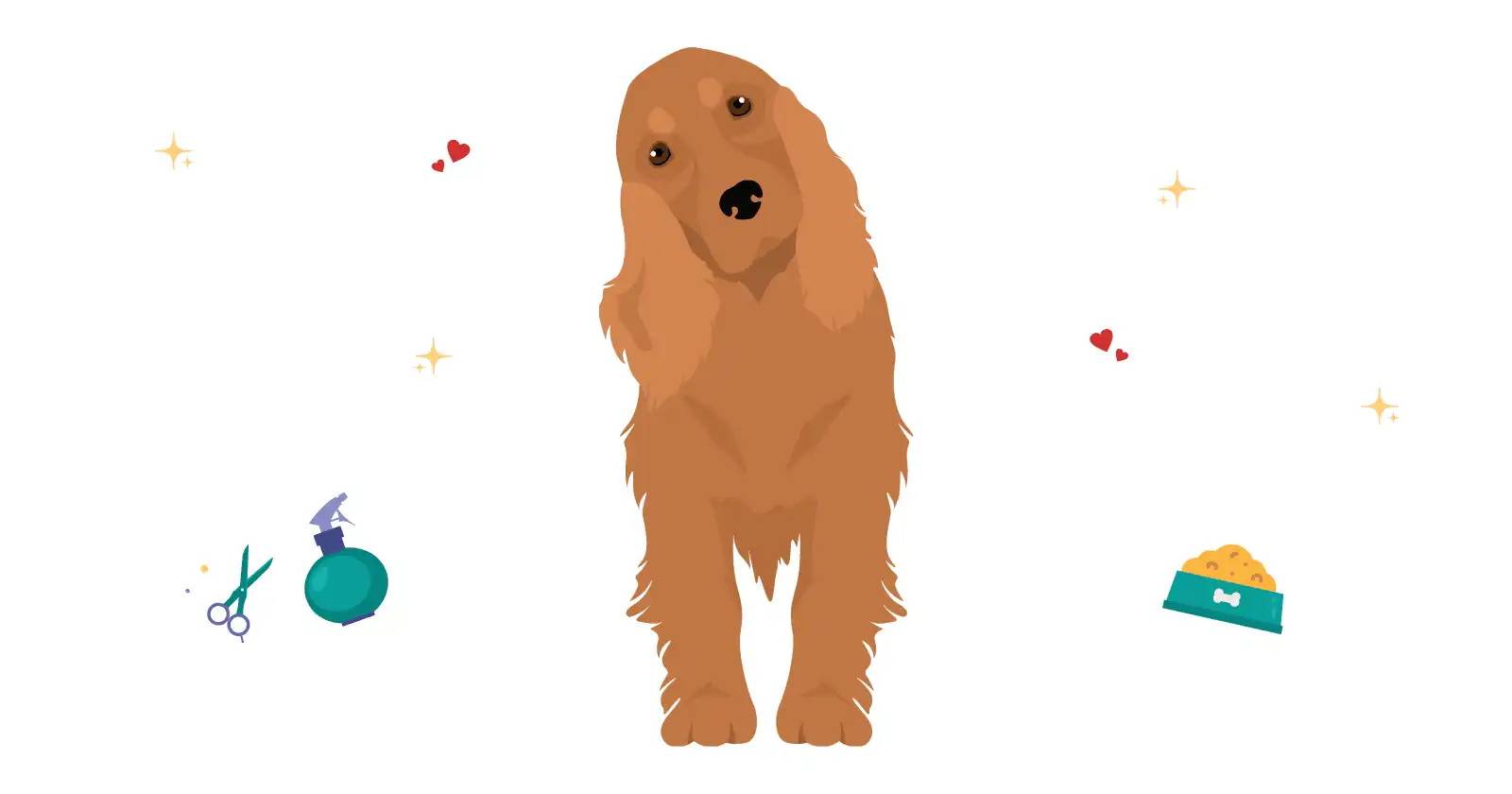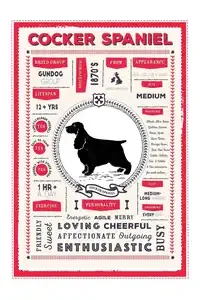All You Need To Know About Cocker Spaniels

Table of Contents
Explore why Cocker Spaniels are one of the cutest in the dog kingdom: they have the perfect balance of charm and fluff, and their wag can fix any kind of problem. These puppies are the definition of pure happiness, from their deep eyes to their joyful personalities. Get ready to read everything you need to know about them and fall head over paw for the lovely world of Cocker Spaniels!
History and origin:
Originating in Spain and then becoming well-known in England, Cocker Spaniels have a storied past. They were initially raised to hunt game birds called woodcocks, hence the term "cocker." Depending on size, two different breeds developed: the larger ones were referred to as "Field Spaniels," and the smaller ones as "Cocker Spaniels." Due to their agility, endurance, and hunting prowess, the smaller Cockers gained great popularity. Cocker Spaniels have also achieved success in a variety of dog contests and sports, such as obedience and field trials.
Physique:

Cocker Spaniels are small to medium-sized dogs with a balanced build. They typically weigh between 20 and 30 pounds (9 to 14 kg) and are 13.5 to 15.5 inches (34 to 39 cm) tall. The head of a cocker spaniel is characterized by a rounded skull, and they have a profound, broad square-shaped mouth, depending on the color of their coat, some of which are golden, black, black & white, liver, red, and many more variations of these, their nose is usually either black or brown. Big, round, dark eyes give Cocker Spaniels a charming and inquisitive look. They have long ears that hang to their shoulders.
Behavior and temperament:
Cocker Spaniels are renowned for having a happy and kind personality. They enjoy being around people and are loving and energetic. Cocker Spaniels often get along well with kids and love being around families. They are relatively simple to train because they are bright and eager to please. These dogs are adaptable and great at various sports, including obedient behavior, agility, and hunting. Cocker spaniels need frequent physical activity and mental stimulation due to their normal energy levels.
Potential behavior problems:

Although Cocker Spaniels are typically well-behaved dogs, they can have certain behavioral problems. Since dogs develop strong bonds with their parents and may get distressed when left alone for long periods of time, separation anxiety is a typical issue. Cocker Spaniels may become shy or afraid around new people or circumstances if they are not properly socialized. To avoid or handle any potential behavioral disorders, it's critical to expose pups to early interaction, cognitive stimulation, and positive reinforcement training.
Grooming needs:
The medium-length, silky coat of Cocker Spaniels must be regularly groomed to avoid clumping and maintain it in a healthy and neat state. They should be thoroughly brushed daily per week because their coat is prone to matting. To untangle and prevent mats in their coat, use a comb with wide teeth along with a slicker brush. Once every 15 days, professional grooming of your fur buddy is highly suggested to maintain their preferred coat length and appearance. Since they only moderately shed, routine brushing helps reduce pet hair around the house. Cocker Spaniels having long pendulous ears must have them cleaned frequently to avoid ear infections. At least once a week, clean your dog's ears with dog-friendly wipes and an ear-cleaning solution. Consider expert grooming of the ears by experts once every month for a thorough cleaning. As part of their general but essential grooming routine, they must also get their nails cut and teeth cleaned periodically.
Healthcare risks:
Some of the healthcare risks you need to look out for to ensure your pet is healthy and happy are:
-
PRA: Cocker Spaniels are susceptible to progressive retinal atrophy (PRA), a degenerative eye disease that can cause blurred vision and blindness. Genetic testing and routine eye exams can be used to detect impaired patients and promote ethical breeding practices. Although PRA cannot be cured, assistance and improvements can be made to improve the quality of life for the suffering dog.
-
Ear infections: These are common in Cocker Spaniels because of their long, floppy ears, which can limit airflow and collect moisture. The prevention and treatment of ear infections depend on periodic ear washing, regular combing to prevent hair from getting caught in the ear canal, and quick and professional vet care at the first indications of redness, odor, or discharge.
-
Allergies: Cocker Spaniels are more prone to allergies than other breeds, including dietary and environmental sensitivities. Skin irritations, itchiness, infections in the ears, and digestive problems are some of the symptoms of allergies. It may be required to identify and stay away from allergies, such as typical environmental triggers or specific food items in their diet. Veterinary advice and perhaps going through allergy testing might help in managing these allergies.
-
Canine Glaucoma: Cocker Spaniels are more prone to developing canine glaucoma, which is characterized by elevated pressure inside the eye. If glaucoma is not treated right away, it can become uncomfortable and cause vision loss. Regular eye exams that include intraocular pressure measurement can help in the early diagnosis and curing of glaucoma.
-
Autoimmune Disorders: Cocker Spaniels are more prone to certain diseases like autoimmune hemolytic anemia (AIHA) and immune-mediated thrombocytopenia (ITP) than other breeds.
Healthcare needs:
Some of the healthcare needs to aid in combatting possible healthcare risks are:
-
Eye infections: Cocker Spaniels are prone to glaucoma, cataracts, and progressive retinal atrophy, among other eye conditions. To identify and treat these diseases early on, routine veterinary eye tests are crucial. Maintaining excellent eye health can also be aided by regular cleansing of the eyes to get rid of dirt and tear stains. To avoid potential vision loss, it's essential to pay close attention to any indicators of redness, discharge, or squinting right away and call for a professional veterinarian.
-
Ear infections: Cocker Spaniels' long, floppy ears make them susceptible to ear infections. Regular cleansing of the ears with an ear disinfecting solution suggested by a veterinarian aids in removing extra wax and debris. After swimming or taking a bath, it's crucial to gently dry the ears to avoid moisture buildup. Regular checks for redness, odor, or discharge should be made, and a veterinarian should treat any ear infection symptoms immediately.
-
Avoid matting: Cocker Spaniels have a lush coat that needs regular maintenance to avoid matting and keep it in good condition. Regular combing, at least a few times each week, keeps the coat clean and helps avoid tangling. To maintain the ideal coat length and manner, professional grooming once every 15 days, including trimming once every 2-3 months is advised. Additionally, periodic washing with a shampoo made especially for dogs keeps their skin and coat healthy and spotless.
-
Avoid obesity: Cocker Spaniels have a propensity to put on weight, which can result in a number of health issues. For weight management, it's crucial to keep an eye on their diet, serve them meals in reasonable portions, and refrain from giving them too many treats. The best option is to follow a customised diet plan, get a free plan for your pet using Kuddle's dog food planner. They must engage in regular physical activity, such as daily walks or playtime, to stay healthy and mentally active. In order to avoid respiratory issues or other heat-related problems, it's crucial to avoid excessive activity, especially in the summertime.
Training needs:

-
Recall training: Cocker Spaniels have a natural curiosity and a desire to follow smells, so recall training is essential to keep them safe when participating in off-leash activities. A reliable recall is strengthened by using positive reinforcement, progressively introducing distractions, and liberally rewarding pets who return when called. It is advised to practice recall in safe, controlled environments before moving on to more difficult situations.
-
Scent Work and Retrieval: Cocker Spaniels are naturally inclined to retrieve and have a good sense of smell. Engaging them in games of retrieving or scent work can stimulate their minds and draw on their innate abilities. It is easier to keep them interested and content when you use items to play with, snacks, or scented materials while progressively raising the level of difficulty. Additionally, these actions help to fortify the connection between you and your fur baby!
-
Positive Reinforcement: Cocker Spaniels, like any other dog breed, respond favorably to training techniques based on positive reinforcement. They enjoy receiving praise, gifts, and awards from their owners and are motivated to please them. Utilizing approaches for positive reinforcement, such as clicker training or verbal signals and incentives, aids in encouraging and reinforcing desired behaviors.
-
Basic Obedience: It's crucial to teach Cocker Spaniels the fundamental commands of sit, stay, come, and heel for their safety and general behavior. These instructions lay the groundwork for etiquette and discipline. Cocker Spaniels can be sensitive to voice tones and easily put off by harsh training techniques; therefore, patience and regularity are essential while training these sweet souls.
In conclusion, Cocker Spaniels are charming and affectionate companions who respond well to positive reinforcement-based training methods and benefit from early socialization and consistent obedience training. By availing of professional services at Kuddle, pet parents can provide their Cocker Spaniels with regular check-ups and the necessary care and training early on to ensure a happy and fulfilling life for both the pet and their hooman!


